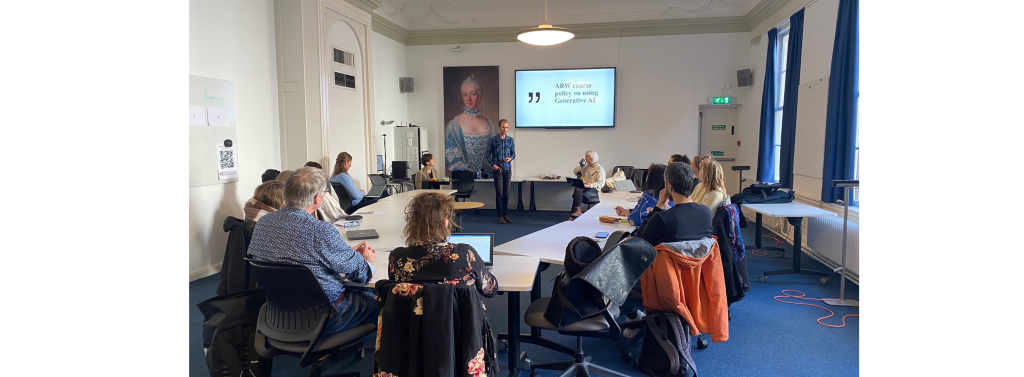
Recap: Teaching Tomorrow: exploring GenAI in education
The rise of Generative Artificial Intelligence (GenAI) is reshaping education. It offers opportunities but also challenges and food for thought. Within several faculties, AI tools are already being used in an ethically responsible way. Reason enough for the Special Interest Group (SIG) for Educational Use of AI to organize an event on 19 March 2024. To share good practices, listen to inspiring speakers, reflect on the current initiatives within UvA and discuss applications in everyday educational practice. On this page, you will find a recap of the event. You can read more about the speakers, workshops and key outcomes and highlights. And where to go for more information and your questions about GenAI.
Creating conditions for responsible integration of AI
Getting a message across well is most important
At 15:00, Lela Mosemghvdlishvili opened the event in a very well-filled Doelenzaal in the University Library. Lela is chair of the Special Interest Group (SIG) for Educational Use of AI and opened the event with an interactive activity. Participants heard three voice recordings, where a teacher was expressing concerns about use of GenAI in education. Attendees were asked to guess which of these speech recordings was generated by AI and which was by a human. This sparked fun interaction and brought up a spectrum of reactions, culminating in a thought-provoking takeaway that it is becoming increasingly difficult to maintain the separation between GenAI and human activities. Lela emphasized the need to move away from ‘either/or’ attitude and focus on how ethical use of GenAI is an interactive engagement between technology and humans, emphasizing the role of a human in reviewing, selecting and finalizing output generated by GenAI.
Restrained UvA policy on use of GenAI
After this Ivar Kolvoort (educational advisor AI at TLC central) took over and gave an overview of what are the current policy discussions within the UvA. The current policy (July ’23) is cautious and does not allow active use of tools like ChatGPT by students or lecturers. The policy is currently under revision to allow more possibilities of using GenAI applications safely and responsibly in the classrooms. Next to policy discussions, Ivar introduced what new initiatives are being launched. For example, across different faculties, totally 13 pilots are ongoing where GenAI will be used in teaching. All in all, Ivar emphasized what are the conditions for using GenAI in education and how these conditions are being negotiated and shaped at the university and faculty levels.

…
“We need to move away from the binary view that work is either produced by GenAI or not”
Focus on exploring and innovating
As the third speaker, Dora Achourioti (Head of Studies for the Academic Core at Amsterdam University College) focused on teachers’ perspective and gave an overview on what lessons were learned thus far. She shared her views on the current developments and influence of GenAI in our education system. There are many initiatives that together will help create the conditions for responsible use and integration of AI. Dora: “Collaboration is and will remain an important success factor in this. We have to get rid of the idea that we have to determine whether work is produced by GenAI or not. But we need to start asking not IF GenAI was used but, more importantly, HOW it was used in relation to the learning objectives.” The challenge is that there is not one rule you can apply when it comes to using GenAI in relation to learning objectives or assessment. Flexibility and diversity are essential and the focus for future policy should be on exploring and innovating rather than focusing on risk and mistrust.
GenAI’s help in practising with patient cases
As the last speaker, Floor van der Steijle (educational advisor at the Medical Faculty) gave a demonstration of an advanced experiment with GenAI within the Faculty of Medicine. There, students will soon practice doing an interview with a patience using a PAItient simulator. This simulator will be used to complement the exercises in conversation skills which thus far is performed by actors and are not widely available due to being difficult to organize
Discussion and interaction during academic writing & prompting workshops
Workshops were set up in different rooms within the University Library for participants to join.
Workshop 1 GenAI and academic writingThis workshop for teachers and course coordinators focused a lot on the use of ChatGPT in writing: from policy to assessment design. There was plenty of room for showing and discussing ethical GenAI practices in academic writing. This included discussion of assessment, where due to usage of GenAI tools in writing, the weighting of items in the grading rubric was adjusted and another example of a pilot within PPLE honors program, where assessment took place ‘on site’ in a special setting where students could not use GenAI. |
 |

|
Workshop 2: Prompt EngineeringIn this hands-on workshop teachers learned how to use GenAI in an ethical way to prepare for lectures, tutorials and give feedback to students. For example, there were a lot of tips shared on how to best iterate a prompt to generate most accurate responses. For example: ask ChatGPT which prompt you should have given to immediately arrive at the desired outcome. By asking these kinds of questions, teachers improved their prompting skills. As a take away, workshop organizers shared with attendees a list of useful GenAI tools and website. You can find the list here. |
“We need to go back to the drawing board and revisit the role of testing. “
ChatGPT as a panelist during the final discussion
The event concluded with a panel discussion featuring the day’s speakers and workshop facilitators. Notably, ChatGPT chimes in as the panelist too, contributing to the conversation alongside human participants. All questions posed by the audience and the moderator, Lela, were also directed to ChatGPT. This led to a good discussion with several key insights emerging. A particularly striking point was the call to reassess the role of education, especially the function of examinations. As one of the panelists put it: “We need to go back to the drawing board and revisit the role of testing.” While ChatGPT provided extensive responses, it became apparent that its contributions, though detailed, lacked the nuanced depth characteristic of the human panelists’ answers.
Learn more about AI
What’s next in the field of AI. Where can you find more information about GenAI and where can you go with your questions? Check out the useful pages/information below.
- The UvA Teaching & Learning Centres (TLC) share knowledge on the teaching topic of AI with UvA teachers. View the information.
- TLC regularly organises training courses on the use of GenAI within higher education. View an overview of all courses or contact Jacqui Edwards.
- Together with Vrije Universiteit Amsterdam (VU), the UvA is forming a taskforce to anticipate future developments in AI. For more information on the taskforce and its members: contact Tetje Timmermans or Martje aan de Kerk.
- Information about the UvA’s policy on AI can be found here. (only in Dutch available)
More about the SIG AI
The Special Interest Group (SIG) for Educational Use of AI is dedicated to a nuanced examination of emerging ‘generative AI’ (GenAI) technologies in the educational landscape, with a focus on their ethical and meaningful applications in teaching, assessment, and learning.
The SIG is a network of educators working on or interested in integrating GenAI within education in an ethical way. SIG offers regular (hybrid) meetings for members, a collaborative environment where expertise is shared and opportunities to co-create educational events.
Would you like to know more about the Special Interest Group for Educational Use of AI? Please have a look at our webpage, or contact the coordinator Lela Mosemghvdlishvili.
The SIG educational use of AI is an initiative of TLC-Central (UvA Teaching & Learning Centres) in collaboration with the Institute for Interdisciplinary Studies (IIS).





